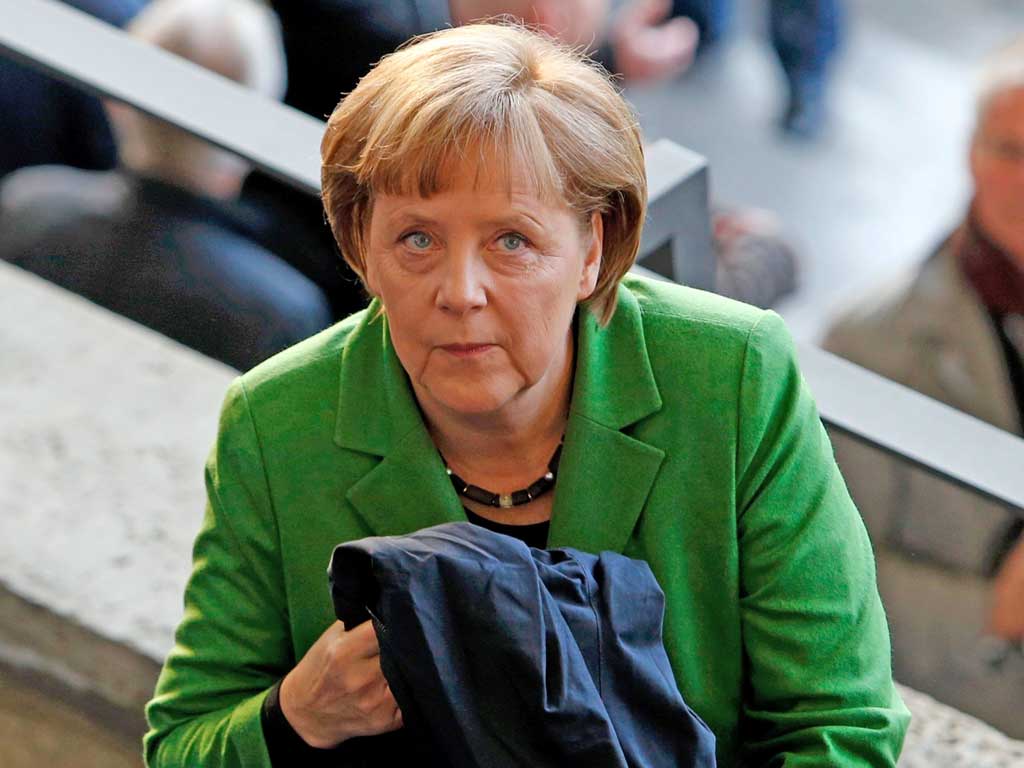Angela Merkel's party humiliated by shock election defeat
German voters reject austerity programme in favour of pro-growth opposition in state poll

Angela Merkel's ruling conservatives suffered a humiliating defeat in key elections in Germany's most populous state yesterday when voters rejected her party's austerity policies and handed a resounding victory to her pro-growth Social Democratic Party opponents.
Ms Merkel's Christian Democrats were shell-shocked by the devastating result they returned in the poll in North Rhine Westphalia, which has a total population of 18 million. Exit polls showed that they secured a mere 25.5 per cent of the vote – their worst performance ever in the state.
Germany's conservative Environment Minister, Norbert Röttgen, the party's candidate in the election, had mounted a vigorous campaign centred on Ms Merkel's austerity policies, which aimed to cut the state's €230 billion debt.
"Today is a very bitter day," Mr Röttgen conceded last night. "We have been clearly defeated."
By contrast, the pro-growth Social Democrats and their candidate Hannelore Kraft, 50, romped home with 38 per cent of the vote. They were expected to form a so-called Red-Green coalition with the environmentalist Greens who won around 12 per cent of the vote. The two parties secured enough seats to obtain an absolute majority in the state parliament.
The conservatives campaigned in the run-up to the poll with an inflatable rubber "debt mountain" to illustrate the region's financial problems. By contrast, Mrs Kraft dismissed rigid saving programmes in favour of growth and insisted that her aim was "putting people first".
Elections in North Rhine Westphalia are considered a key indicator of national voting intentions. Andrea Nahles, the general secretary of Germany's Social Democrats, insisted that the result paved the way for the ousting of Angela Merkel in Germany's general election next year.
There were even suggestions last night that Mrs Kraft, whose political style has been compared to that of Ms Merkel, could run for the post of Social Democrat Chancellor candidate in next year's election.
Ms Merkel's liberal Free Democrat coalition partners were able to avoid a feared electoral disaster and managed to gain 8 per cent of the vote – enough for the party to avoid being left without enough votes to win seats in the state parliament.
Yesterday's result was the second major poll setback for Ms Merkel's conservatives within the space of a week. In elections in the northern state of Schleswig-Holstein, her Christian Democrats secured their lowest share of the vote in over 50 years.
The conservatives' slide began last year when they suffered one of their worst-ever blows in the prosperous southern state of Baden-Württemberg, where they were ousted from power for the first time since the early 1950s by a coalition of Greens and the Social Democrats.
The conservatives are currently in power in six of Germany's 17 federal states. Yet despite the growing unpopularity of her own party, on a personal level Ms Merkel continues to rate as one of Germany's most respected Chancellors ever.
Hollande flies to Berlin for showdown
Officials in both Paris and Berlin are trying to dampen down expectations before the first encounter tomorrow between a newly installed French President and an increasingly beleaguered German Chancellor.
Almost the first act of President François Hollande, after he takes the oath of office in Paris tomorrow morning, will be to fly to Berlin to meet Chancellor Angela Merkel. Europe-watchers will be scrutinising the proceedings closely to see if new Franco-German axis to replace "Merkozy" be a French-dominated "HoMer" or a German dominated "Merklande".
The two leaders will hold three hours of talks followed by a press conference and then a working dinner. Mr Hollande will be trying to persuade Ms Merkel that it is in her own interest, and Germany's interest, to relax her all-austerity approach to the crisis in the Eurozone. Ms Merkel, in contrast, is likely to insist that there is no question of reopening the EU fiscal discipline treaty agreed by 25 out of 27 countries in March and that there is no question of turning on the taps of "deficit" spending.
For the sake of the markets, the two leaders are likely to use their press conference to stake out common ground rather than to emphasise their differences. The Hollande camp points out that he will be travelling almost alone, without his yet-to-be-named prime minister or finance minister. There can, therefore, be no in-depth negotiation.
John Lichfield
Join our commenting forum
Join thought-provoking conversations, follow other Independent readers and see their replies
Comments
Bookmark popover
Removed from bookmarks